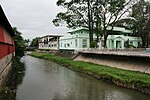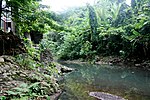Bay, Laguna
1578 establishments in the PhilippinesFormer provincial capitals of the PhilippinesMunicipalities of Laguna (province)Pages with Tagalog IPAPopulated places on Laguna de Bay

Bay () (Tagalog pronunciation: [bɐˈʔɛ]), officially the Municipality of Bay (Tagalog: Bayan ng Bay), and colloquially known as Bae, is a 2nd class municipality in the province of Laguna, Philippines. According to the 2020 census, it has a population of 67,182 people.It is situated 20 kilometers (12 mi) from Santa Cruz and 67 kilometers (42 mi) southeast of Manila. It is also located at the east of Los Baños, west of Calauan, northeast of Santo Tomas and northwest of Alaminos. The patron saint of Bay is Saint Augustine of Hippo, whose his Feast Day is celebrated during August 28. Laguna de Bay, the country's largest freshwater lake, is named after the town.
Excerpt from the Wikipedia article Bay, Laguna (License: CC BY-SA 3.0, Authors, Images).Bay, Laguna
Kalye Onse,
Geographical coordinates (GPS) Address Nearby Places Show on map
Geographical coordinates (GPS)
| Latitude | Longitude |
|---|---|
| N 14.18 ° | E 121.28 ° |
Address
Kalye Onse
Kalye Onse
4033
Laguna, Philippines
Open on Google Maps




